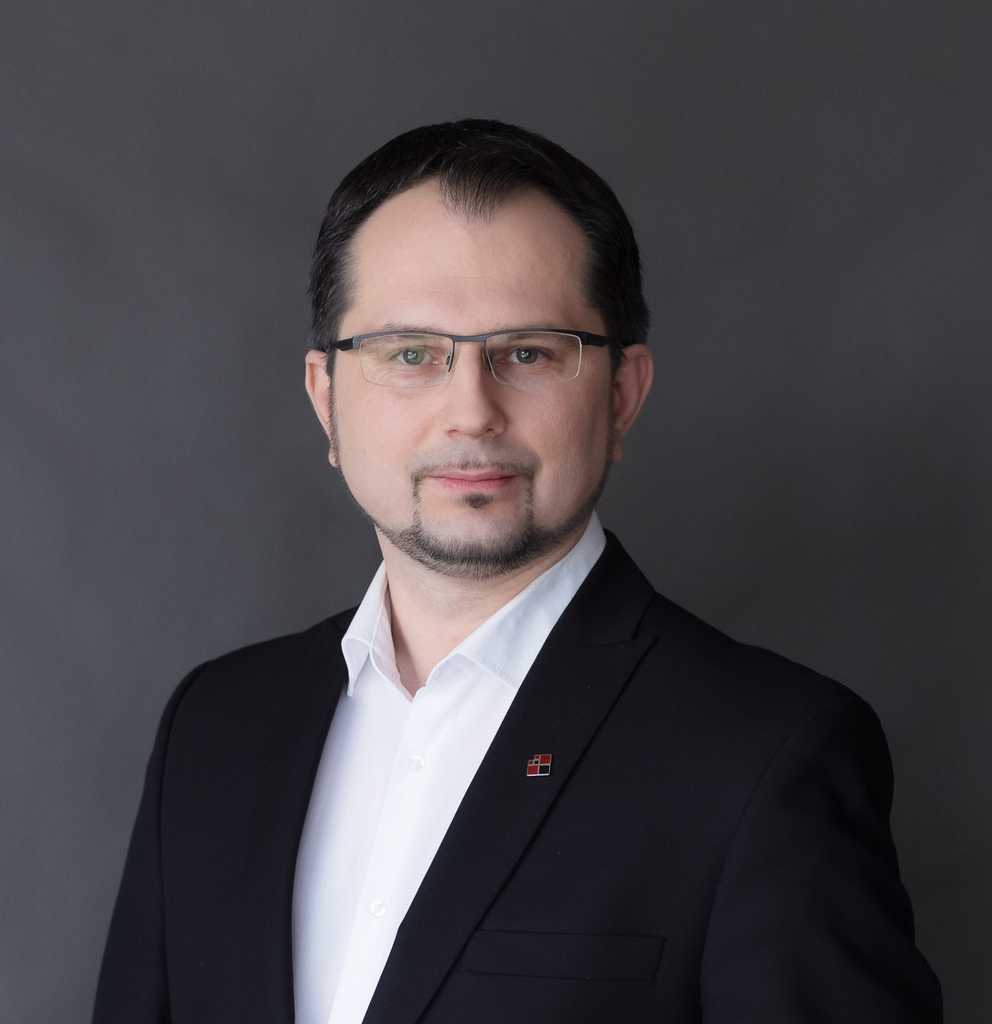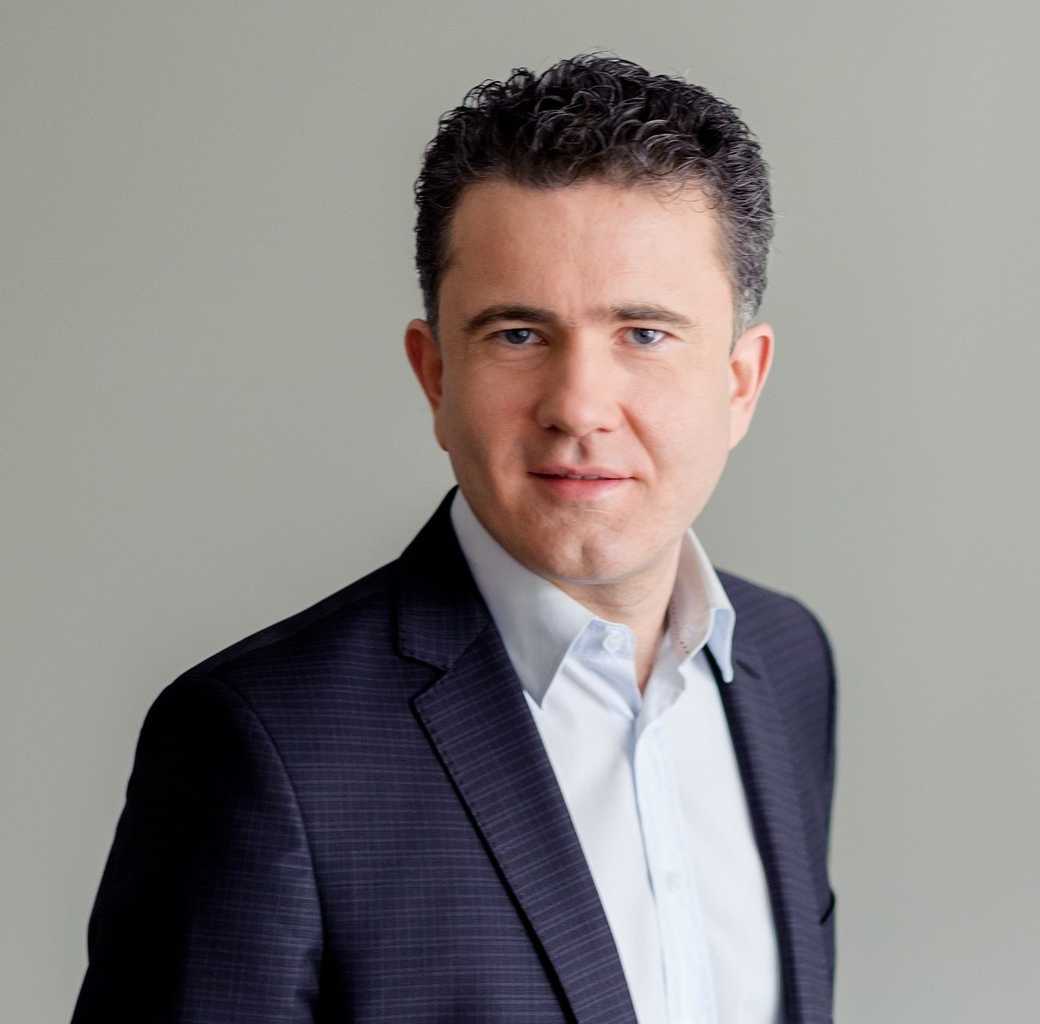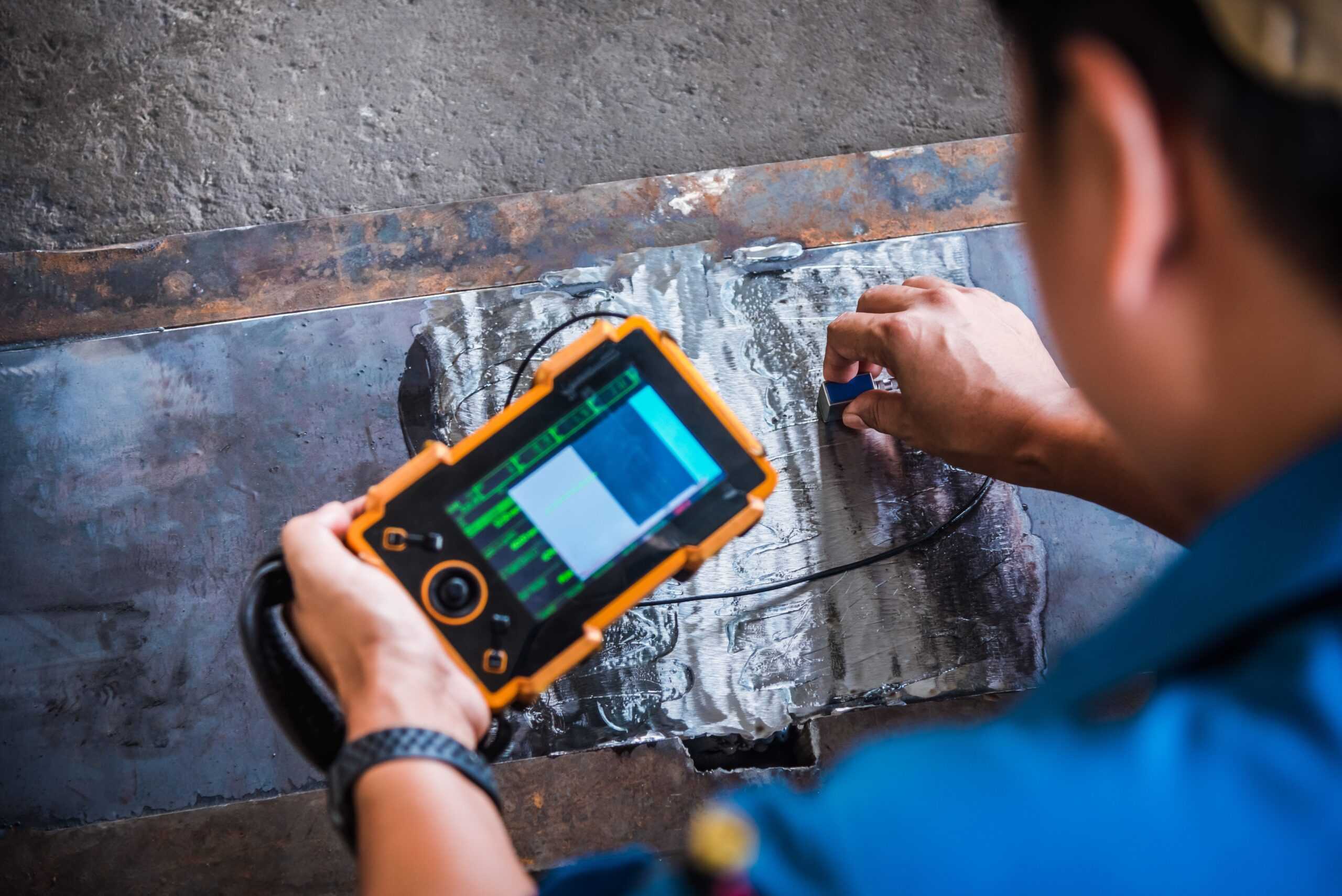EDIH4LT
European Digital Innovation Hub for Central and Western Lithuania

EDIH4LT
European Digital Innovation Hub for Central and Western Lithuania


Industry need driven European Digital Innovation Hub (EDIH) of Central and Western Lithuania consists of 14 partners operating throughout Lithuania and representing different areas of competence and experience.
We are operating in 5 sectors: Manufacturing, Public Sector, Healthcare & Biotechnologies, ICT and Fintech.
Our key competences are Artificial Intelligence (AI) and Cybersecurity (CS) in the fields of Big data, Automated BMS & WMS, Smart Sensors, Robotics, IoT/IoIT, Automation, VR/AR, Automatic reporting.
Project: „INDUSTRY 4.0 LAB PLATFORM: DI4LITHUANIANID“ No. 02-016-P-0003
The European Digital Innovation Center DI4LithuanianID is part of the Industry 4.0 Lab platform, which is coordinated by the Innovation Agency Lithuania.

Dr. Mindaugas Bulota
EDIH Coordinator (KTU)

Mindaugas Kemzūra
Project manager (KTU)

Milda Karčiauskaitė
Project manager (KTU)

Audrius Jasėnas
Senior Expert (Intechcenter)

Dovydas Zinkevičius
Senior Expert (OIXIO)

Virgilijus Dirma
Senior Advisor (Infobalt)

Egidija Veršinskienė
Senior Researcher (L3CE)

Mindaugas Kieža
Senior Expert (Lighthouse Hub)

dr. Marius Laurinaitis
Senior Researcher (MRU)

Lina Giedraitė
Senior Expert (LINPRA)

Eimantė Survilaitė
Senior Expert (ISM)

Vytis Radvila
IT Manager (Klaipėda University)
1. Test before invest
Prototyping, Fostering the Integration, Adaptation of various technologies, Concept validation, Testing and experimentation with digital technologies (software), Demonstration activities, Knowledge and technology transfer
2. Support to find investment
Access to funding (Fin institutions and investors: ERDF, Horizon Europe, InvestEU, Transition Mechanism and others), Investors support (Venture Capital entities, Bank loans)
3. Skills & Training
Short-term advanced Digital Skills training courses, Visioning and strategy development, Awareness creation, Mentoring, Hosting or providing training, Technology road mapping
4. Ecosystem building & Networking
Networking, Incubator/Accelerator support, Voice of the Customers

The ultrasound solutions developed by the Lithuanian company Ulsontech are already attracting interest not only from European but also from Asian businesses. Dr Vykintas Samaitis, CEO of the company, which has successfully entered international markets, says that this achievement is not only the result of consistent work, but also of the introduction of new digitalisation solutions, thanks to the support of the European Digital Innovation Centre “EDIH4LT” and the Innovation Agency.
International attention for Lithuanian technology
Ulsontech, a manufacturer of state-of-the-art ultrasound technology, is rapidly making its way into international markets, thanks to the advice of the EDIH4LT Digitalisation Centre. The small but globally renowned company has been successfully developing ultrasound solutions for production process control, liquid level measurement and material defect detection since 2019. The technologies developed in Lithuania not only solve industrial problems, but also open new opportunities in the energy, chemical, medical and construction industries.
“We started with an idea of how ultrasound can be applied to industrial needs, and step by step we have developed a fully certified product, which, with the help of the digitalisation centre, is successfully making its way to the international markets,” says Dr. Samaitis, CEO of Ulsontech. According to him, today the Lithuanian product is already CE-certified, which allows the product to be marketed throughout the European Union. Rail, manufacturing and oil companies in Europe and Asia are interested in the solutions developed in Lithuania.
The idea to use ultrasound technology for non-invasive measurements came to Samaitis during his doctoral studies at KTU. Later, he joined the Institute of Ultrasound Science and together with his colleagues researched various measurement solutions. “The Ulsontech device was born during the development of an ammonia liquid meter for a chemical industry company. This unique Lithuanian device can measure the amount of liquid in any container without opening it.
“Such niche solutions are motivated by the opportunity to create something that doesn’t exist, the needs of customers and clients, and scientific curiosity. When working with technology, we often try to see not only the commercial potential of an idea, but also its scientific potential,” says Samaitis. According to him, the Ulsontech project was launched in 2019-2020, so it took almost 5 years to commercialise the idea. Today, this innovation can already be applied to solve problems of safe operation, ecology and energy saving wherever remote monitoring is needed – in medicine, construction, manufacturing, nuclear energy. It is estimated that 10 Ulsontech solutions have already been deployed in companies worldwide.
Product development has been driven by exceptional specialists
According to Samaitis, the sophisticated technology used by Ulsontech is compact – it is the size of a shoebox, so it can be integrated into the control centres of many industrial companies, but there is no limit to perfection. According to the researcher, the digitisation centre’s biggest help in enabling the company to move forward even faster was the ability to create an improved version of the product, and with the help of external consultants, the product reached the highest level of technical advancement, Level 9. Today, it has been commercialised and is being successfully deployed in production.
“The Digitalisation Centre has helped us to address specific problems that arose during application. We received advice from specialists with rare expertise, so we were able to improve the product in terms of technology, software and functionality,” says Samaitis. The newer version of the product is more accurate, more compact and easier to use. It is estimated that a total of around EUR 100 000 has already been invested in the development and commercialisation of this innovation.
Ulsontech’s main focus is the European and Asian markets. However, Samaitis points out that the market for ultrasound solutions in the industry, although important, is very niche, so it is not easy to find customers in other countries. According to him, it was the support of the EDIH4LT centre, in contact with other centres in the European network and decision makers, that was extremely valuable and contributed significantly to the company’s international development.
The Digitisation Centres welcome companies in different fields
According to Teresė Škutaitė, Head of the Innovation Agency GreenTech Hub, these centres are consortia, so they are made up of both business and scientific institutions. Experts can therefore provide a very wide range of solutions and suggest the best way to go digital. The experts tailor solutions to the individual needs of each organisation or company.
“All companies facing challenges in choosing or applying new digital solutions can seek free advice from the digitisation centres. This is a great opportunity for businesses to take a bold step forward with the help of professionals. The EDIH4LT Digital Innovation Hub alone has been used by more than 300 clients in the last two years,” says Teresė Škutaitė, Head of the Innovation Agency GreenTech Hub.
According to Dr Mindaugas Bulota, EDIH4LT coordinator, the main sectors in which the Hub specialises are manufacturing, healthcare and biotechnology, IT and financial technology. Large companies, companies with fewer resources for investment and public sector organisations all apply for free advice.
“Most companies, in particular, want to assess their digital maturity and create a roadmap for developing and commercialising innovation. The biggest value is that we can create an environment and test the technology in the centre before making an investment decision,” says Mr. Bulota.
In the later stages, EDIH4LT advises clients on finding external funding, assists in the implementation of new systems, organises training and catalyses the expansion in foreign countries. The training services are particularly popular, with over 600 participants in the centre’s training courses alone over two years.
Mr. Bulota reminds that the centres can be contacted via the ESIC contact details and services start immediately after an initial needs assessment.
Published by: Rasa Naktinė, Innovation Agency

Lithuania has three European Digital Innovation Hubs (EDIHs), whose main objective is to help SMEs integrate digital innovation more effectively into their operations.
These centres provide training and advice to company employees, test digital technologies before investing in them and contribute to the development of new products and services. This is a unique opportunity for those facing challenges in the introduction and use of new digital technologies and in the digitalisation of company processes. The services are provided to companies as State aid or as de minimis aid.
National significance
EDIH4LT, one of the 3 European Digital Innovation Hubs focusing on Central and Western Lithuania, has been operating in Lithuania for the past 2 years and is delivering tangible results.
Genomika, a young but internationally renowned developer of advanced genetic technologies, was faced with the need to structure and protect large volumes of genetic data. The company’s processes for analysing genetic test data have so far lacked a standardised solution for data storage, processing and traceability.
Together with the EDIH4LT digital innovation centre team, the company has developed and implemented a standardised system with procedures to ensure the seamless storage, analysis and reproducibility of the data stream.
According to Dr. Lukas Žemaitis, co-founder of Genomika, the developed processes and described procedures have been implemented in the Confluence platform, which has solved the problems of data storage, backup, documentation and recording of experimental results.
“Large-scale genetic research processes are long-term and involve large volumes of data, so only clearly structured information can ensure the reliability of the data and the experiments. The system developed for the company ensures data availability and reproducibility regardless of staff turnover, computer system failures, or human error,” says Dr. L. Žemaitis.
According to Dr. Mindaugas Bulota, coordinator of the European Digital Innovation Centre for Central and Western Lithuania (EDIH4LT) and head of the KTU National Innovation and Business Centre (KTU NIVC), the development of genetic technologies in Lithuania opens up significant opportunities not only for the health sector, but also for the whole country.
“From an economic point of view, the development of genetic technologies promotes the growth of the biotechnology sector and the diffusion of innovation. In Lithuania, this field is developing rapidly and innovations based on genetic research can be exported, thus making a significant contribution to strengthening the country’s competitiveness in the international market. Investing in research and commercialisation of genetic technologies strengthens the country’s scientific potential, provides highly skilled jobs and attracts international projects. It is very gratifying that with the help of the Digital Innovation Centre, companies such as Genomika are able to improve the efficiency of their processes,” says Dr. M. Bulota.
Also, with the help and advice of EDIH4LT experts, a representative website was created for Genomika, which helps to present the company’s activities more effectively to the general public, establishes contacts with partners and strengthens communication with existing customers. In addition, by integrating the latest technologies and with the consent of the users of the website, the possibility of collecting data and providing valuable insights to improve the company’s performance was introduced.
Changing the routine of medical laboratories
SMO in Kaunas, worked with EDIH4LT experts to address one of the main challenges facing modern medical laboratories – improving the efficiency of routine, time-consuming work. Despite medical advances, many routine laboratory activities are still performed by humans, which limits the speed and efficiency of processes and increases the likelihood of errors. In order to automate these processes, EDIH4LT experts from KTU have implemented automation algorithms and developed an innovative RPA (Robotic Process Automation) platform that simplifies the coordination of research.
According to Ignas Galminas, CEO of SMO, the innovative platform not only integrates patient registration, sample documentation and logistics processes, but also automatically updates the status of tests, transmits the results to the customer and generates invoices.
“The system is currently in the testing phase, but it is already estimated that it has reduced the time needed to coordinate laboratory processes by around 30%. The system has allowed us to do away with the need to use different applications to carry out the process – prior to the automation, we used at least 6 different software tools at different stages. The current system allows everything to be done on a single platform”, said I.Galminas.
Increased efficiency and lower costs
Innovations such as the SMO laboratory automation platform and the Genomika data analysis system are becoming real-life examples of how the European Digital Innovation Centres initiative is contributing to the digitalisation of Lithuanian business. These hubs enable companies to grow and compete in the global marketplace, while fostering a culture of digital transformation and efficiency.
In order to further strengthen the competences of companies’ employees, the EDIH4LT Centre invites the representatives of Central and Western Lithuanian companies to gain knowledge on how to effectively develop an e-commerce website. The training will take place on 7 November. Vytautas Narbutas, head of the digital technology agency Tandemum, will share the best practices of e-shop development, including effective strategies and common mistakes that hinder successful e-shop development.
On 27-28 November, Klaipėda will host a unique technology workshop “DroneLab: learn how to build a drone”, where, for the first time in Western Lithuania, all those interested in technology and innovation will have the opportunity to assemble their own drones, which will be a real help on the Ukrainian front. The event is organised by Lighthouse Digital Innovation Centre.
LTMilTech, headed by Algirdas Stonys, one of the five Lithuanian companies specialising in the production of defence drones, will provide full technical quality assurance during the workshop.
Innovation leadership in the Western Lithuania region is priority No. 1
The Lighthouse hub in Klaipėda is well known for its leadership in innovation and technology, for fostering the start-up ecosystem and for creating a vibrant community. The Digital Innovation Centre (DIC), which has been successfully operating in the Lighthouse Innovation and Business Campus for the past two years, is making a significant contribution to the digitisation of innovations in Western Lithuania and businesses across the region.
Drone collecting workshops have already been held in Vilnius and Kaunas, while Klaipėda has never hosted such an event. “After talking to the major social partners of DIC: Klaipėda City Municipality, Klaipėda Port Authority, we realised that the future strategic plans of the interested parties are closely linked to drone technologies. We also organised the first international EUDIS European Union Defence Hackathon in Klaipėda in the summer together with Kaunas University of Technology, and we missed more drone technology ideas from the participating teams. This made it even more of a priority to organise a drone assembly event” – said Mindaugas Kieža, CEO of Lighthouse Hub. Klaipėda is already an important hub for technology development in the Western region and such a hands-on skills development workshop will further contribute to the region’s innovation development.
Assembling drones – putting technology into practice
The Open Drone Workshop is open to everyone, regardless of their technical experience “If a person can assemble an IKEA chair, there will be no problems in the drone workshop – you just need to be thorough,” said Algirdas Stonys, the founder and head of the company LTMilTech, which will be curating both the theoretical and the practical parts of the drone event.
He said that it is very important to participate in the workshop organised by the Lighthouse Innovation Centre: the more people in Lithuania are aware of drone technology and its security applications, the more prepared the country will be for unexpected situations. “Klaipėda lacks a lot of offerings in this field, so the open and free workshop is a great opportunity for Klaipėda residents to get involved in the world of technology,” says A. Stonys.
Drones for Ukraine: a tangible gesture of support
The drones assembled at the workshop will be sent directly to Ukrainian troops to help them carry out various missions. Typically, up to ten drones are needed for an operation, so the number of drones collected during the workshop will be a significant contribution to the frontline.
On the battlefield, innovation and technological advances are becoming vital. As LTMilTech says, in the context of war, innovation means survival. “Innovation and logistics won World War II. Today it is even more important because technology literally saves lives,” says Algirdas Stonys. The company he heads has already delivered over 3,000 drones to Ukraine.
Drone workshop programme
On the first day of the event, 27 of November, there will be a 1.5-hour theoretical lecture on drones, open to all interested participants, during which they will learn all the key information on the technical composition, purpose and uses of drones, helping them to prepare for the workshop.
On 28 of November, a full-day workshop will be held where one stream of 6 participants will assemble 2 drones in 1 hour under the supervision of professional instructors. It is expected that during the whole workshop 5 streams of teams will collect a total of 10 drones. The event will end with a teleconference with the Ukrainian team, where the collected drones will be symbolically handed over. Certificates of appreciation will also be presented to all participating teams.
The Lighthouse Hub is part of the European Digital Innovation Hubs (EDIH) network, which helps businesses in the Western region to embrace digital technologies. The event is free of charge and funded by the European Union’s Industry 4.0 Lab Platform: DI4LithuanianID project. The Drone Workshop is open to teams of companies (up to 3 persons) with sufficient de minimis aid balance and no financial difficulties.
Registration for the event you can found here.
The European Digital Innovation Hubs (EDIHs) launched a Digital Maturity Assessment tool that will help Small and Medium Enterprises (SMEs) to identify their strengths and weaknesses in the digital transformation of their business. The tool is open to all companies and freely available in 32 languages.
Businesses can use this tool to evaluate their maturity across six key criteria: digital business strategy, digital readiness, digital skills and empowerment, data management, automation and intelligence, and green digitalisation. With this insight, SMEs can plan their digital growth more effectively and receive tailored advice from their local EDIH. Additionally, other actors like the Enterprise Europe Network and industrial clusters can leverage the Digital Maturity Assessment tool to help their SMEs digitalise and use artificial intelligence.
Comprising 228 hubs, the EDIH Network is dedicated to bolstering the digital capabilities of companies and public sector organisations. With 151 hubs funded by the Commission’s Digital Europe Programme and 77 backed by national or regional resources, the network will be a catalyst for digital innovation and growth across Europe.
The Digital Maturity Assessment tool will help achieve the Digital Decade target of 75% uptake of Artificial Intelligence (AI), cloud and/or big data by European companies. The network of EDIHs, together with the AI Office now in full swing, will be a one-stop-shop for SMEs and public services seeking AI and digital transformation solutions.
More information is available here: Open Digital Maturity Assessment
April 10, 2024, INFOBALT, the largest Lithuania national association of ICT organizations, organised the highly anticipated “National Cyber Security Forum: NIS2 Directive Adoption”. The event aimed to introduce the NIS2 directive and its adoption perspectives to both the public and private sectors of Lithuania.
The main goal of the forum was to offer insights into the NIS2 directive, shedding light on its implications for various types of organizations. Moreover, the aim was to motivate national stakeholders to kickstart actionable measures immediately following the event.
With an overwhelming response, the conference attracted over 200 participants, showcasing a keen interest in understanding the NIS2 directive and its potential impact on organizational finances, processes and resources.
In the light of this, Infobalt introduced the EU instruments aligned with the goals of the NIS2 Directive, offering support to the most vulnerable segment of business entities, SMEs.
With over 4000 Lithuanian organizations set to be impacted by the NIS2 directive. Thus, consolidation of existing tools, initiatives, projects and expertise in the field could significantly help in streamlining this challenging process and minimizing disruptions to business activities.
Digitisation received generous attention during the coronavirus pandemic. Digital tools have become a means for many businesses and the public sector to maintain at least a modicum of normality. Everyone has said so much about digitisation that the understanding of its benefits in business and the public sector seems obvious.
However, the partners of the European Digital Innovation Centre’s DI4 Lithuanian ID project say that awareness still needs to be raised, while at the same time moving towards specific, individual problems and targeted training, practical testing of technologies and support for digitisation pilot projects.
A deeper understanding is needed
Although some digital tools were adapted during the coronavirus pandemic, such as remote meetings and digitisation of documents, that was mostly the end of the story. As experts say, it is just a change of form – from analogue, physical to digital.
From the fact that information is transferred from paper to digital form and sent by email, but then it is up to a human being to process it – to read it and take action, the process itself has not changed in the slightest and the real benefits of digitisation have not been felt by the organisation.
Digitisation is therefore a necessary but not a sufficient condition for digitisation, where digital technologies are applied to change certain processes. For example, by automating production, information reception, processing and response, where this does not require human decisions.
“Companies and organisations often do not have specific knowledge, although they have heard of digitisation and digitalisation, but do not know what it would mean for them and their processes”, says Mindaugas Bulota, Head of the National Centre for Innovation and Entrepreneurship of Kaunas University of Technology (KTU), the coordinator of the “DI4 Lithuanian ID” project.
According to him, a significant obstacle is also the natural resistance of employees, because in order for an organisation to use digital technologies to change certain processes, it has to learn, and additional activities arise. “In the beginning, you have to spend more time, more effort, but in the long term it helps to reduce costs,” he notes.
Benefits – and exchange of experience
The EU-funded DI4 Lithuanian ID project, which started a year ago and will continue for the next couple of years, aims to help businesses and organisations take those initial steps towards digital transformation.
The core competencies of the project consortium, which consists of 14 partners, are focused on artificial intelligence and cyber security, big data, automated BMS and WMS, smart sensors, robotics, IoT/IoIT, automation, VR/AR, and automated reporting.
The consortium operates in 5 sectors: manufacturing, public sector, healthcare and biotechnology, ICT and financial technology.
It starts with an introduction to the technologies, then goes deeper, exploring how specific problems can be solved with them.
“The interest is there. Around 150 companies have already participated in our training. They range from one person to large companies with 500 or more employees, as well as public sector bodies,” says the head of KTU’s National Centre for Innovation and Business.
“One of the most important benefits of these initial events and trainings is the opportunity to network with each other. Representatives of organisations come with a certain vision of digitalisation, and at the event they talk to their colleagues, share that vision, their practice and experience”, says M.Bulota.
He said that clients have very individual questions, which is why targeted meetings are organised in the later stages for companies to examine their specific cases.
Digitalisation in its various aspects
According to M.Bulota, the great value of the consortium is that its members cover the whole spectrum and clients can get not only the technological knowledge, but also the legal knowledge that is necessary for digitisation, and can look at potential investments from different angles.
“System integrators who are among the partners and who implement technological solutions on a daily basis can point out from their own experience what works, what to look out for, and what might not be valuable,” explains the head of the KTU’s National Centre for Innovation and Business.
The training and the development of certain solutions for testing are free of charge. “The aim is to give our clients the opportunity to test solutions and technologies before investing in them, to gain the necessary knowledge,” says Dovydas Zinkevičius, Director of Columbus Lietuva, one of the partners of “DI4 Lithuanian ID”.
According to him, the project programme provides an opportunity to clarify one’s need, helps to form a reasoned investment decision after trying one or another tool.
Some of the project’s clients have already matured into concrete implementations. “We hope to share good examples in the near future”, says D.Zinkevičius.
M.Bulota noted that it would be useful to provide support to companies in the later stages of digitisation, when pilot deployment projects are carried out on a limited scale. “This would further encourage digitisation in our industry, public sector and other organisations,” he noted.
We invite you or your colleagues (up to 5 persons per company) to attend a free 5-day practical training course designed for professionals and specialists in product projecting and development.
Learning themes:
Design Automation with DriveWorks Solo
Creating configurable 3D models, drawings and reports
Working in the SolidWorks environment with practical examples
Applying CPQ (Configure-Price-Quote-Quote) solutions in manufacturing companies.
More about the training: https://intechcentras.lt/2025/04/01/gaminio-virtualaus-dvynio-programavimo-mokymai/
Location: Studentų g. 56, Kaunas (possibility to participate remotely)
Duration: 5 days
5, 10, 12, 17 and 19 June 2025
Registration: https://2cm.es/YLWp
*To participate for free, the company must:
Be classified as an SME
Be registered in the Central and Western Lithuania region
Have no financial difficulties
After registration, you will be asked to complete the Single Company Declaration, SME Declaration and the Consent for the Provision of Services.
You are invited to the training course “Synergies between LEAN, Artificial Intelligence (AI) and digitalisation solutions in production management”, funded by the EDIH project. The training is free of charge for the company.
Registration is available here.
Find the training programme here.
More about the training:
IMPORTANT INFORMATION: You must meet the following criteria for your registration to be confirmed and for you to be able to attend the training free of charge:
In order to verify your company’s compliance with these requirements, we will ask you to fill in the following documents: single company declaration, SME declaration, agreement on the services received and the act of acceptance of the transfer of services.
Looking to expand your network in areas of digital twins for buildings and cities, artificial intelligence, sustainability, and energy? Want to be well-prepared for the upcoming Horizon Europe calls?
The projects SmartWins, SustAInLivWork ir EDIH4LT invite you to the networking event “Digital Pathways to Sustainability: 2025–2026 Calls – Smart Cities and AI”, taking place on 13 May in Kaunas.
Participants will have the opportunity to establish strategic partnerships with academia and industry, exchange ideas, and find synergies for new project proposals.
The event will be held in English and is free of charge, but registration is required here.
Companies are invited to the training course “Applying Artificial Intelligence in Business”!
From automating everyday tasks to content creation, visualisations and more efficient work planning, learn how to apply artificial intelligence in business. We’ll discuss AI tools, practical tasks and legal aspects.
Useful for anyone who wants to exploit the potential of IoT in their business!
Training programme and more information you can find here.
No registration fee. Register here.
We invite you to the FREE practical cyber security training on 10 April!
The one-day course will help participants understand the main threats in the digital space, learn how to protect company data and IT infrastructure, identify fraud schemes and gain practical knowledge on how to protect themselves from financial and reputational losses.
The training will be led by: Prof. Dr. Marius Laurinaitis, an expert with many years of experience in the field of cybersecurity and information technology regulation.
During the training, participants:
Registration you can find here.
Important:
The training is partly funded by the European Union project “Industry 4.0 Lab Platform: DI4LithuanianID”.
Training time 13:00-17:00, 2 breaks of 15 minutes each.
Artificial intelligence + your business = faster solutions!
The Lithuanian Association of Digital Technologies INFOBALT, invites you to take part in a one-week distance learning course “Artificial Intelligence: an easier path to business success” for small and medium-sized enterprises in Central and Western Lithuania.
What will you learn?
Training programme you can find here.
Registration you can find here.
The Lithuanian Association of Digital Technologies INFOBALT together with Kaunas Chamber of Commerce, Industry and Crafts invites you to take part in the Artificial Intelligence training course “Artificial Intelligence in Business: practical applications” for small and medium-sized enterprises from Central and Western Lithuania. The training will take place on 12 February at 9 a.m. For those unable to attend live, there will be an opportunity to join remotely.
Tired of Excel spreadsheets? Employ advanced data management tools and artificial intelligence! This training will give you the opportunity to learn how artificial intelligence (AI) works and how it can be applied to your data. You will analyse different areas of AI, such as machine learning and data analytics, along with examples of how these technologies can be applied in business.In addition to theoretical knowledge, there will be a strong focus on practical challenges. You will have the opportunity to analyse data and model solutions in real-life situations, allowing you to understand how data-driven solutions can improve business processes and solve problems efficiently. This will be an interactive training course for anyone who wants to expand their knowledge of data science, artificial intelligence and data-driven solutions.
The training will be conducted by Rolandas Rimkevičius, artificial intelligence expert, head of the data analytics company Dataera and founder of the Data Academy DATACADEMY. Participants will have the opportunity to receive certificates confirming their knowledge.
In order to be approved for registration and to be able to attend the training free of charge, you must meet the following criteria:
In order to verify your company’s eligibility, we will ask you to fill in the following documents: a declaration from one of the companies, a consent for the services received, a digital maturity questionnaire.
The training programme can be found here.
Registration you can found here.
Discover the latest trends in digital innovation and technology!
On 12 February we invite you to the Digital Innovation Day in Kaunas, KTU Santaka Valley. You will learn how to stay ahead in the world of artificial intelligence, what opportunities are offered by the European Horizon and EIT programmes, and discuss the most important aspects of national projects.
Date: 12 February 2025
Location: 3 hall, KTU Santaka Valley, K. Baršausko g. 59, Kaunas
Don’t miss the opportunity to hear from experts and make valuable contacts!
Registration you can find here.
Event program you can find here.
Want to dive deep into digital technology and see how drones are made? The Lighthouse Digital Innovation Centre aims to promote a culture of innovation and invites you to join the DroneLab event, where you will not only learn how drones work, but also build one with your own hands!
This event is for all tech enthusiasts who want not only knowledge but also a real hands-on experience.
HOW WILL IT WORK?
Theory + practice
TECH PARTNERS
LTMilTech + Algirdas Stonys and 6 drone instructors = ultimate tech team. With their help and mediation, the drones you create will reach those who need them most.
WHO CAN PARTICIPATE AND HOW TO REGISTER?
Participation is free for business teams of 3 people who meet the following criteria:
The registration form can be found here.
IMPORTANT: The number of participants is limited. Places are subject to completion of the de minimis documents and confirmation.
The event is funded by the European Union project Industry 4.0 Lab Platform: DI4LithuanianID.
Register now and be part of DroneLab! It’s not just a celebration of technology, it’s real help for those who defend freedom.
Increase your company’s revenue by creating digital products. How?
On 25 November, EDIH4LT invites you to participate in the training course “Principles of Digital Product and Service Development” for representatives of companies from Central and Western Lithuania.
During this intensive full-day training, participants will:
The training will take place in the Klaipėda Conference Hall, Lighthouse Hub, Liepų str. 83, Klaipėda.
The training will be led by the following experts: associate professor Eigirdas Žemaitis, PhD, Head of the Entrepreneurship and Innovation Programme at ISM, and Tomas Šiurna, ISM lecturer and digitisation consultant.
The training programme can be found here.
You are welcome to register here.
Improve your strategy – discover digital success today!
Imagine how your business could reach new heights with the power of artificial intelligence and neuromarketing insights. Today, this fusion is no longer just a vision of the future, but a real opportunity to deliver an effective, innovative approach to customer behaviour and marketing.
We invite you to a series of FREE trainings, which will take place from 13-27 November and will be focused on professionals in the Western Lithuania region looking for modern solutions and ways to increase brand influence and apply AI tools to achieve successful results.
The training will be conducted by:
Programme:
Full training programme here.
Find out how AI, neuromarketing and advanced digital tools can take your business to the next level!
To be approved for registration and to attend the training free of charge, you must meet the following criteria:
In order to verify the eligibility of the company, the following documents will have to be filled in: Single Company Declaration, SME Declaration, Hardship Assessment Table, Digital Maturity Questionnaire (which will be sent to you upon registration).
The registration form can be found here.
IMPORTANT: The number of participants is limited. Places are subject to completion of de minimis documents and confirmation. The training is funded by the European Union project “Industry 4.0 Lab Platform: DI4LithuanianID” (Training value 3000 EUR).
If you have any questions – sandra.liekyte@lighthouse.lt
Location: Lighthouse SIC, Liepų str. 83a, Klaipėda
Register and get ready to gain knowledge that will help your digital transformation!
On 7 November, we invite you to participate in the EDIH4LT project training “E-shop development: successful strategies and practical tips”, which will take place at the KTU M-LAB laboratory centre and will be aimed at representatives of companies from Central and Western Lithuania who would like to find out about the best practices of e-shop development. During the training you will hear how to effectively develop an e-shop, what strategies to follow to achieve success, and learn about common mistakes and how to avoid them.
The training will be led by Vytautas Narbutas, head of the digital technology agency Tandemum, who will talk in detail about the importance of digital marketing tools in e-commerce and show how they can help you achieve better results.
At the end of the event, Mindaugas Kemzūra, EDIH4LT project manager, will present the opportunities that the EDIH4LT project offers to companies.
Training agenda you can find here.
Registration you can find here.
The Lithuanian Association of Digital Technologies INFOBALT together with Kaunas Chamber of Commerce, Industry and Crafts invites you to take part in the Artificial Intelligence training course “Artificial Intelligence in Business: practical applications” for small and medium-sized enterprises from Central and Western Lithuania. The training will take place on 31 October at 9 a.m. For those unable to attend live, there will be an opportunity to join remotely.
Tired of Excel spreadsheets? Employ advanced data management tools and artificial intelligence! This training will give you the opportunity to learn how artificial intelligence (AI) works and how it can be applied to your data. You will analyse different areas of AI, such as machine learning and data analytics, along with examples of how these technologies can be applied in business.In addition to theoretical knowledge, there will be a strong focus on practical challenges. You will have the opportunity to analyse data and model solutions in real-life situations, allowing you to understand how data-driven solutions can improve business processes and solve problems efficiently. This will be an interactive training course for anyone who wants to expand their knowledge of data science, artificial intelligence and data-driven solutions.
The training will be conducted by Rolandas Rimkevičius, artificial intelligence expert, head of the data analytics company Dataera and founder of the Data Academy DATACADEMY. Participants will have the opportunity to receive certificates confirming their knowledge.
In order to be approved for registration and to be able to attend the training free of charge, you must meet the following criteria:
In order to verify your company’s eligibility, we will ask you to fill in the following documents: a declaration from one of the companies, a consent for the services received, a digital maturity questionnaire.
The training programme can be found here.
Registration you can found here.
Lithuanian Digital Technology Association INFOBALT together with Kaunas Chamber of Commerce, Industry and Crafts and Enterprise Europe Network invite you to participate in the conference “#Cybersecurity in the organisation: invisible threats and visible solutions”, dedicated to small and medium-sized companies from Central and Western Lithuania.
Cyber security is of paramount importance for SMEs due to the ever-growing threats in the digital space. These businesses are often targeted by criminals due to limited resources for security, and cyber attacks can cause significant financial losses, reputational damage and legal problems. By ensuring a high level of security, companies can avoid these risks, maintain customer trust and ensure successful business growth.
How do I ensure cyber security in my organisation? How to protect against cyber threats and what to do in the event of an incident? We will talk about this on 4 September at 13:00. We will discuss cyber security with cyber security professionals atthe BLC Conference Centre, Donelaičio g. 60, Kaunas, Lithuania, on September 14th, 2018.
We invite you to attend the event and learn how to protect your business from invisible threats and avoid visible consequences. The conference will not only provide valuable knowledge, but also an opportunity to share experiences and establish new business contacts. Participants will have the opportunity to receive a certificate confirming their knowledge.
To be confirmed and receive the training free of charge, you must meet the following criteria:
In order to verify the company’s eligibility for the registration of State aid, we will need to complete the following documents:
For more information, please contact gabija@infobalt.lt or +37060996875
In order to verify your company’s eligibility, we will ask you to fill in the following documents: a declaration from one company, an agreement on the services received, a digital maturity questionnaire.
Please hurry to register as places are limited -> https://forms.gle/rVocBJ1LaQEtTtt5A
Digital transformation today – no longer an option but a necessity?
On 29 August we invite you to the FREE training course “Digital Tansformation Foundations for Your Business Success: Data, Processes, People, Technology” organised by ISM University of Management and Economics.
During the full-day training, participants will:
The training will be delivered by Lect. Tadas Narutavičius, Digitalisation Practitioner, Mentor at HealthTech Accelerator. He is an alumnus of the ISM Executive School Digital Transformation and Business module.
After the training we also invite you to a networking event for refreshments, during which an inspiring presentation on entrepreneurship and digitalization will be given by the Head of the ISM Entrepreneurship and Innovation Programme, Assoc. Prof. Dr. Eigirdas Žemaitis.
Find the training programme here.
Registration form here.
IMPORTANT: The number of participants is limited to 30 places. Only 1 person per company or organisation can register. Places are confirmed by completing de minimis documents and receiving confirmation. The training is funded by the European Union project “Industry 4.0 Lab Platform: DI4LithuanianID”.
EDIH4LT invites companies and public organisations from Central and Western Lithuania to register for a series of digitisation training sessions, which will provide you with an insight into five topics of current interest:
To be confirmed and receive the training free of charge, you must meet the following criteria:
In order to verify the company’s eligibility for the registration of State aid, we will need to complete the following documents:
IMPORTANT: The number of participants is limited to 30 places. Places are subject to the completion of the State aid documents and confirmation. The training is partly funded by the European Union project Industry 4.0 Lab Platform: DI4LithuanianID.
Location: Baršausko g. 59, 51423 Kaunas
The training is partly funded by the European Union project Industry 4.0 Lab Platform: DI4LithuanianID.
Please hurry up and register, the number of places is limited.
Registration link: https://forms.office.com/e/y58MzmZHZg
EDIH4LT invites companies and public organisations from Central and Western Lithuania to register for the Artificial Intelligence (AI) training course “Artificial Intelligence: friend or foe?”:
The training will be conducted by Prof. Tomas Krilavičius, an AI expert and board member of the Lithuanian Artificial Intelligence Association.
Date: 2 April, 2 pm.
Venue: Vytautas Magnus University, V. Putvinskio str. 23, Kaunas
Preliminary programme of the training is available here.
To be confirmed and receive the training free of charge, you must meet the following criteria:
In order to verify the company’s eligibility for the registration of State aid, we will need to complete the following documents:
IMPORTANT: The number of participants is limited to 30 places. Places are subject to the completion of the State aid documents and confirmation. The training is partly funded by the European Union project Industry 4.0 Lab Platform: DI4LithuanianID.
Please hurry up and register, the number of places is limited.
Registration -> https://forms.gle/
We invite you to 2024 February 23 organized FREE data protection practical trainings according to the GDPR!
One-day intensive courses will help participants understand privacy threats, the main GDPR categories and requirements, the latest GDPR requirements implementation practices, the practical nuances of privacy risk management, and will allow them to try out different data protection risk management tools.
Training will be conducted by:
During training, participants:
In order for your registration to be approved and to participate in the training for free, you must meet the following criteria:
IMPORTANT:
Pre-registration: https://forms.office.com/pages/responsepage.aspx?id=SHPGoK96QEGcWjouBr8PDc1o9a9-NNNMrG0-EoOb5ddUN1laNk9LVE5VREhDUUQ4NTRKUkUzRzNJSC4u&origin=lprLink
We invite you to the first FREE Artificial Intelligence practical training in Klaipėda, Western Lithuania! This two-day intensive course will help participants understand the potential, threats and practical applications of AI and will allow them to try out different AI tools.
During the training participants will:
– Learn the principles, potentials and threats of artificial intelligence
– Learn how to use AI to develop new marketing solutions and improve the quality of results
– Learn how to apply AI tools in company work processes
– Perform a variety of practical tasks with AI tools
The training will be delivered by:
– Antanas Bernatonis / Why AI founder, artificial intelligence trainer
– Patricija Butkutė / Why AI Creative Lead
The number of participants is limited to 30. Participants are limited to 30 participants.
Pre-registration is required: Microsoft Forms
AI breakthroughs are changing the way business is done. By targeting Artificial Intelligence (AI), companies in the public sector, manufacturing, health, biotech, fintech and other sectors can gain a huge competitive advantage in the marketplace, increase team productivity, improve the quality of their tasks and discover new business opportunities.
The training is partly funded by the European Union project “Industry 4.0 Lab Platform: DI4LithuanianID” (Training value 1000 EUR).
More information about the project is available here.
EDIH4LT invites all representatives of the manufacturing sector from Central and Western Lithuania to register for the digitisation training series, where you will be able to get acquainted with 5 technologies and their application in manufacturing:
*Dates to be revised in the course of the project.
Location: Baršausko g. 59, Kaunas”
Registration link: https://forms.office.com/e/ngNHFQ07QL
We invite you to participate in one more training of the project “Opportunities of Artificial Intelligence technologies in practice”, which will take place on June 6-7, in KTU “Santakos” valley, K. Baršausko str. 59, Kaunas.
During the training you will learn:
On May 22th DI4 LITHUANIAN ID (EDIH4LT) together with colleagues from the Smart Wins with Digital Twins project arganizes a joint event during which you will learn about Digital Twins and smart city technologies. Also about Industry 4.0 and innovative technologies changing various markets, including the built environment.
KTU Faculty of Construction and Architecture started a new project “SmartWins”. Citizen engagement and research often do not go hand in hand, creating a gap between people’s needs and innovative solutions. To fill this gap, we invite you to join the event at the KTU Faculty of Construction and Architecture in Kaunas!
KTU is also the coordinator of one of the three European Digital Innovation Hubs (EDIH) launched in Lithuania. EDIH aims to facilitate the digital transformation of business and public sector entities operating in the central and western region of Lithuania and the deployment of key digital technologies. DI4 LITHUANIAN ID (EDIH4LT) will present the project’s essence and potential opportunities in the networking part at the end of the event.
The event will be held in Lithuanian. Participation is free, but registration is required.
More information about the event and the registration form you can find here.
See you at the event!
We invite you to attend the event: “European Horizon”: opportunities for SMEs and start-ups, where will be presented the latest funding opportunities for SMEs and start-ups under the “European Horizon” programme.
During the event, experts from the Lithuanian Research Council will present the structure, main objectives and cascading calls of the European Horizon Programme. They will also provide valuable information on EIT initiatives and the EIC Pre-Accelerator programme.
In the second part of the event, we invite you to take part in a hands-on DMA (Digital Maturity Assessment) workshop, where you will be able to assess your organisation’s digital maturity together with INFOBALT representatives and plan the next steps for improvement.
Event place: Kaunas „Spiečius“ (Kęstučio g. 86 / I. Kanto g. 18, 2nd floor)
Event time: 27-05-2025, 10:00 – 12:00
Registration here.
You must meet the following criteria to be confirmed for the event and to be able to attend for free:
The company must not be in financial difficulties;
The company must be registered in Western and Central Lithuania.
In order to verify your company’s eligibility, we will ask you to fill in the following documents: a declaration from one company, an agreement on the services received, and a service acceptance certificate.
Event programme:
10:00 – 10:20 | Overview of the “European Horizon” programme
Speaker: Deividas Petrulevičius, Lithuanian Research Council (LRC), National Contact Point (NCP) for Digital Technologies and Industry.
The structure of the European Horizon programme, its main objectives, funding opportunities and priorities are presented. It also briefly discusses how Lithuanian organisations, companies and start-ups can successfully engage in projects.
10:20 – 10:40 | EIT opportunities
Speaker: Milda Karčiauskaitė, Lithuanian Science Council, EIT National Contact Point
The presentation will introduce the EIT Digital, EIT InnoEnergy and EIT Manufacturing initiatives, some of the EIT Knowledge and Innovation Communities. You will learn about opportunities for start-ups, training programmes, collaboration with technology partners and support for digital innovation.
10:40 – 11:00 | EIC Pre-Accelerator Programme
Speaker: Jovita Žėkaitė-Maconko, Lithuanian Science Council, EIC & EIE National Contact
This session will focus on the launch of the EIC pre-accelerator programme, a programme offered by the European Innovation Council (EIC) to support early-stage innovators who have reached TRL 4. The presentation will include the benefits for participants and how to write an application for this call.
11:00 – 11:20 | European Horizon Programme Project Cascade Calls
Speaker: Deividas Petrulevičius, Lithuanian Research Council (LRC), National Contact Point (NCP) for Digital Technologies and Industry
Cascade Calls are a flexible opportunity for SMEs, start-ups, universities and other innovators to access funding by participating in the European Horizon Programme’s Project Calls. This part of the presentation will explain how these calls work, where to look for them and how the application process may differ from traditional programmes.
11:20 – 11:30 | Q&A
11:30 – 12:00 DMA evaluation workshop with INFOBALT.
Speaker: Speakers: deputy director of INFOBALT Virgilijus Dirma, office and communication manager Gabija Katulė and project assistant Jorė Bendinskaitė.
The workshop will help businesses to assess their digital maturity according to the principles of DMA (Digital Maturity Assessment). It will analyse the areas of activity of a company, start-up or organisation in order to identify key challenges and areas for improvement. Based on the insights, participants will have the opportunity to plan the next steps in their digital transformation, as well as receive information on available support tools and services.